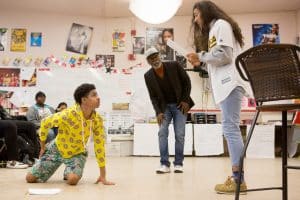101 Practice Suggestions from the Aurora Institute Annual Survey
CompetencyWorks Blog

Each year the Aurora Institute conducts a survey of our network of members, event attendees, and stakeholders in our database to inform our policy and practice work. This second blog post on the survey results shares responses to the question, “What is one successful practice you would recommend for schools and districts in the coming school year?” Responses were curated for brevity and clarity.
Equity
- Go back to your equity vision and mission. Ensure that all stakeholders are committed/recommitted to how personalized, competency-based learning serves as a systemic design to address issues of equity.
- Focus on equity work and retrain teachers and staff.
- Leverage the pandemic to raise and address issues of equity and access.
- Prioritize paraprofessionals as a great resource for becoming teachers. Implement retention strategies. Often they are the most diverse group of educators in the district.
- Develop equitable community engagement, as described by the Great Schools Partnership.
- Revamp grading policies to diminish the negative effects of implicit bias often embedded in grading policies rooted in power and control.
Relationships, Supports, and Social-Emotional Learning
- Build relationships with students, including those who are less engaged. Never let up—daily contact. Relationships first. Make personal contacts, by name, every day.
- Make time for advisory structure each week. We need space to make it happen outside of instructional times.
- Provide wraparound support to at-risk students.
- Offer compassion and grace.
- Promote social presence in online instruction, which aids in the relational capacity of the whole class and small groups. I’m a fan of the Community of Inquiry framework.
- Provide online mindfulness training like Mindful Schools or Smiling Minds.
Structuring
- Develop a portrait of a graduate at the local or state level.
- Have conversations to explore “what if” and get people thinking outside tradition.
- Ease into new ideas gradually.
- Allow one teacher per subject to be dedicated to setting up a master online class (that other teachers could use as a model).
- Keep the doors open later and on Saturdays.

Competency-Based Education Strategies
- Empower students to drive their own learning.
- Find at least one thing you can do to empower students and give them voice in your classroom in a way that you have not before. Then see how that grows and changes the way you and your students experience the next year.
- Use one day of the week as a flex day to meet with students you need to circle back to and give students time to practice being self-directed.
- Offer creative, personalized, project-based learning activities.
- Implement standards-based grading.
- Take your state’s learning standards and hone in on “power” or “essential” standards.
- Use the Assessment for Learning Project’s Five Core Shifts. Have educators place assessments along a continuum for each of the shifts to determine what is already in place and what they need to improve.
- Develop student-driven projects and have exhibitions of learning. Be careful not to checklist it. Make it about depth of learning.
- Have multiple pathways for assessing students.
- Ask questions of your stakeholders, and listen.
- Offer tutoring and small-group learning.
- Develop task-neutral performance scales that guide instruction, assessment development, and evidence-based grading practices.
- Use reflective portfolios for students to be more aware of their own learning.
- Do project-based learning with capstone presentations.
- Have student projects be rooted in the needs of a community and driven by collaboration with external experts.
- Develop personal learning plans for each student.
- Design based on student, family, and teacher feedback rather than a top-down approach.
- Emphasize mastery over seat time.
- Engage all students in complex thinking through authentic learning tasks.
- Focus on defining what students should produce as demonstrations of competency.
- Develop curriculum and grading that allows for more individualized student growth.
Professional Learning & Planning
- Offer adult social-emotional learning opportunities and communities of care.
- Implement strategies to recognize, address, and manage stress and burnout for teachers, administrators, school staff, students, and parents.
- Develop high-quality professional learning communities.
- Offer competency-based micro-credentials for teachers.
- Provide more time for collaboration and reflection. Spending quality time planning together is required for making meaningful change in education.
- Personalize professional learning and use it as a springboard to personalized, competency-based learning for students.
- Provide training in instructional design and pedagogy to all teachers.
- Build understanding among educators and educational leaders that collaboration and mutual support are needed to best serve students.
- Implement authentic, consistent, and quality coaching for all teachers to empower them to become more socially, culturally, and emotionally connected educators.
- Provide professional learning for administrators, not just educators.
- Build a team of disciplined educators with an extraordinary level of unity that can solve problems at a higher level and achieve outlier results.
- Develop forums and platforms to share activities and lessons across districts, states, nationally, and internationally.

Supports & Differentiation
- Differentiate, differentiate, differentiate. Always provide choices.
- Implement universal design for learning and accessibility standards.
- Don’t assume all students were paying as much attention during COVID.
- Offer opportunities for students to self-enroll where they feel they have fallen behind. Make those opportunities diagnostic and adaptive to their learning.
- Make learning visual to support all learners, including those who are deaf, English language learners, or have autism or dyslexia. Online learning can be too text heavy.
Family and Community Engagement
- Ask families and students what parts of the remote/COVID learning experience should remain, evolve, and grow.
- Use professional advisory boards to ensure competencies are externally validated as relevant.
- Provide more opportunities for active parental engagement in the education system.
- Check in and build relationships with students and families.
- Assume families are struggling and need support, not judgment.
- Be open to new delivery and assessment formats to accommodate students’ home, health and learning situations.
- Support parents to develop active roles in supporting their children.
Technology
- Develop stable infrastructure to build trust that technology will work consistently and not impede the learning process.
- Adopt a learning management system to support consistency, equity, and flexibility.
- Use technology to amplify the role of the teacher.
- Build common checklists of processes involving technology.
Other Pedagogical Practices
- Talk less and listen more (sorry Hamilton).
- Continue to have a blended learning component with true teacher engagement.
- Implement online learning such that students can choose to take a class online or on campus depending on their needs and schedule.
- Make sure there are games and movement activities to balance the learning.
- Do ongoing spiral review with students.
- Use lesson plans and instructional objects in PBS LearningMedia.
- Implement a flipped classroom strategy.
- Correct/eliminate elementary (K-6) knowledge gaps in core subjects.
- Review the learning design of your curriculum.
- Use the Appreciative Inquiry Model to support schools through a strengths-based approach rather than a deficit-based approach.
- Provide students with access to instruction any time
- Support teachers as they implement High-Quality Instructional Materials.
- Focus on growth!
- Don’t give up!
- Experiment!
- Don’t be afraid to do something different. Even just one small change in one classroom can begin to make a big difference for students.
True, it’s not quite 101 suggestions, but all that curating condensed the list a little! If you read this far, I’m optimistic you found tips to inform and inspire your work. We appreciate everyone who responded to the survey.
Learn More
- Strategies for Shifting to Student-Centered Learning from the Aurora Institute Annual Survey
- Resources from the Strategic Reflection on the Field of Competency-Based Education
- Springpoint’s Phased Approach to Implementing Competency-Based Education, Phase One: Establishing a Solid Foundation
Eliot Levine is the Aurora Institute’s Research Director and leads CompetencyWorks.